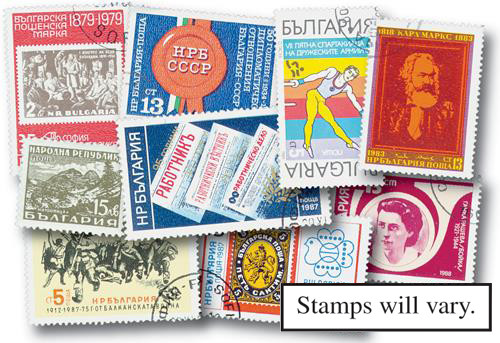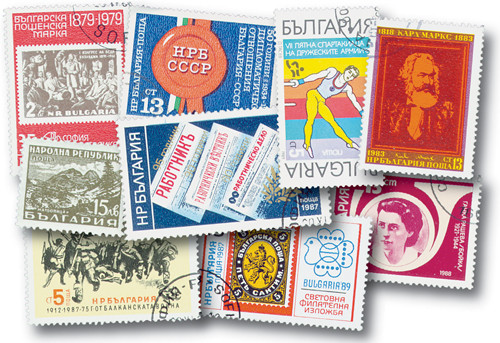
# MP1291 - Bulgaria, 1400 Different Stamps
Stamps Reflect Bulgaria’s Communist Past
Nestled at the crossroads of Europe and Asia, Bulgaria is an ancient country with a rich heritage. Bulgaria’s stamps capture its unique culture and reflect traces of the Soviet Union’s Communist influence. Order today and soon you’ll be enjoying the best of Bulgarian art, history and culture on stamps.
Discover More About Bulgaria…
Bulgaria’s roots date back to the seventh century, when the Bulgar tribes from Asia mixed with the Slavic tribes in this area of the Balkan Peninsula. The first Bulgarian empire enjoyed prosperity for several centuries before the Turks conquered it in 1396. The Bulgarians were under the rule of the Ottoman Turks for 500 years. This explains why the Turkish influence is so evident in the country’s language and architecture.
Russia helped Bulgaria drive the Turks out during the 1800s. Because of this, Bulgarians have close ties with Russians. Both speak similar languages and once shared the same Orthodox Christian religion. Turkish and Russian influences played a part in forming Bulgaria. In 1946, the former Soviet Union was instrumental in the overthrow of the Bulgarian king. Bulgaria remained a communist state until 1990, when the power of the Communist Party was revoked.
Bulgaria is located on the Balkan Peninsula, with the Black Sea at its eastern border. Greece and Turkey lie to the south, Yugoslavia to the west, and Romania to the north. Although it is an industrialized nation that produces machinery, textiles, and chemicals, agriculture is still very important. The Danube Plain to the north provides rich farmlands for cereals and fruits. In the southern part of the country, farmers grow cotton, vegetables, tobacco, and roses (for perfume). Bulgaria’s mineral springs are a great attraction to European vacationers seeking health resorts as a means of relaxation.
A country’s flag can often sum up what the country and its people value the most. For its own flag, Bulgaria has placed its national emblem – a lion framed by wheat stalks – over a field consisting of a white stripe for peace, a green stripe for agriculture, and a red stripe for military courage.
Stamps Reflect Bulgaria’s Communist Past
Nestled at the crossroads of Europe and Asia, Bulgaria is an ancient country with a rich heritage. Bulgaria’s stamps capture its unique culture and reflect traces of the Soviet Union’s Communist influence. Order today and soon you’ll be enjoying the best of Bulgarian art, history and culture on stamps.
Discover More About Bulgaria…
Bulgaria’s roots date back to the seventh century, when the Bulgar tribes from Asia mixed with the Slavic tribes in this area of the Balkan Peninsula. The first Bulgarian empire enjoyed prosperity for several centuries before the Turks conquered it in 1396. The Bulgarians were under the rule of the Ottoman Turks for 500 years. This explains why the Turkish influence is so evident in the country’s language and architecture.
Russia helped Bulgaria drive the Turks out during the 1800s. Because of this, Bulgarians have close ties with Russians. Both speak similar languages and once shared the same Orthodox Christian religion. Turkish and Russian influences played a part in forming Bulgaria. In 1946, the former Soviet Union was instrumental in the overthrow of the Bulgarian king. Bulgaria remained a communist state until 1990, when the power of the Communist Party was revoked.
Bulgaria is located on the Balkan Peninsula, with the Black Sea at its eastern border. Greece and Turkey lie to the south, Yugoslavia to the west, and Romania to the north. Although it is an industrialized nation that produces machinery, textiles, and chemicals, agriculture is still very important. The Danube Plain to the north provides rich farmlands for cereals and fruits. In the southern part of the country, farmers grow cotton, vegetables, tobacco, and roses (for perfume). Bulgaria’s mineral springs are a great attraction to European vacationers seeking health resorts as a means of relaxation.
A country’s flag can often sum up what the country and its people value the most. For its own flag, Bulgaria has placed its national emblem – a lion framed by wheat stalks – over a field consisting of a white stripe for peace, a green stripe for agriculture, and a red stripe for military courage.











